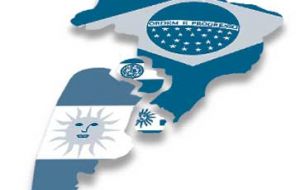MercoPress. South Atlantic News Agency
Paraguay could vote on Venezuela’s Mercosur incorporation after summer recess
 Senators in Paraguay are divided but will they resist the rest of Mercosur?
Senators in Paraguay are divided but will they resist the rest of Mercosur? Paraguayan Congress will remain blocking Venezuela's entry into Mercosur trade bloc “as long as President Hugo Chávez continues intervening in foreign affairs”, stated the head of the Senate, Miguel Carrizosa, just a day after Brazilian lawmakers approved the incorporation. However his successor in the job affirms the opposite.
“The atmosphere in our Senate tells us not to approve Chávez's entry into Mercosur”, added Carrisoza. “This has nothing to do with our Venezuelan brothers: we really appreciate them. Unfortunately, their president is nowadays interfering in foreign affairs”, he specified.
Chávez had been strongly criticized by Paraguayan opposition lawmakers months ago, after he stated that the right-wing government sector was designing a plan to overthrow their President, Fernando Lugo.
However Senator Emilio Camacho, who will take over the Senate presidency when Congress resumes session in March 2010 said the debate “could be reopened after the summer recess”.
President Lugo and his catch-all Patriotic Alliance for Change coalition can count with the support of Camacho’s National Encuentro Party, which favours the incorporation of Venezuela to Mercosur. Last August he removed the vote from the agenda of the Senate which is controlled by the opposition.
Last Tuesday, the Senate of Brazil ratified Venezuela's entry into Mercosur as a full member after approving the country's Protocol of Accession by 35 votes in favour and 27 against in the ratification process.
Brazil’s president Lula da Silva has long advocated the incorporation of South America’s largest oil exporter to the block made up of full members Brazil, Argentina, Paraguay and Uruguay and started in 1991.
The Brazilian Senate took two years to approve Venezuela’s entry while Argentina and Uruguay were the first to vote on the issue.
With Venezuela included, according to a release from the Brazilian Foreign Affairs ministry, Mercosur would comprise 270 million population and 76% of South America’s GDP. Furthermore Venezuela “is already the second buyer of Brazilian goods in South America, ranks as the sixth destination for Brazilian exports in the world and represents Brazil’s second largest trade surplus”.




Top Comments
Disclaimer & comment rulesCommenting for this story is now closed.
If you have a Facebook account, become a fan and comment on our Facebook Page!